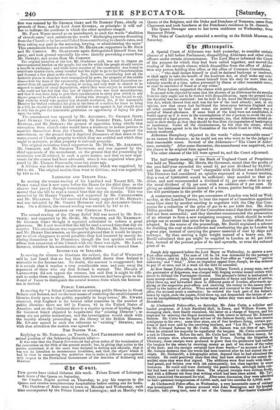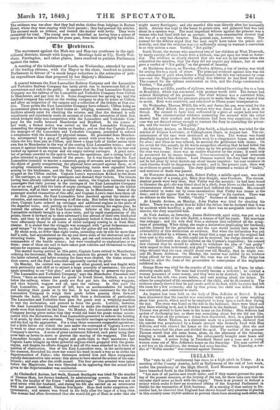gbe A Special Court of Aldermen was held yesterday, to
consider certain clauses of a bill before Parliament, disqualifying Aldermen and other civic officers under certain circumstances. The Lord Mayor informed the Court of the purpose for which they had been called together, and moved the reading of the seventh clause, which disqualifies from the office of Alder- man any person holding that office, or the office of Common Councilman,
. . . . "who shall declare himself or shall be declared bankrupt or insolvent, or shall apply to take the benefit of the Insolvent Act, or shall make any com- position with his creditors, or absent-himself from his duty for more than six calendar months at a time, unless prevented by illness or other reasonable cause, or shall be convicted of fraud or of any crime.'
Sir Peter Laurie supported the clause with peculiar satisfaction. It seemed to be objected by some that the absence of an Alderman for six months from his duty ought not to be visited with disqualification, upon the ground that the duration was too restricted: but he held in his hand the Municipal Corpora- tion Act, which showed that such was the law of the land already; and, in his opinion, now that steam had facilitated the intercourse between England and all other countries by land and water, six months' leave of absence was a period of liberal allowance. If some limit of the kind were not established, it would appear as if it were in the contemplation of the rejectors to avoid the con- sequences of a legal process. It was as necessary, too, that Aldermen should at.. tend to their duties as that they should be free from the imputation of bankruptcy or insolvency. Under all the circumstances, he felt that the clause, which had in fact been agreed loin the Committee of the whole Court in 1834, should remain unaltered.
Alderman Humphery objected to the words "other reasonable cause" as an excuse for absence; as he could not see who were to be the judges of that reasonable cause. Several of the Aldermen—" The Court of Alder- men, certainly." After some discussion, the amendment was negatived, and the clause in its original form agreed to.
The other clauses of the bill were agreed to, and the Court adjourned.
The half-yearly meeting of the Bank of England Court of Proprietors was held on Thursday. Mr. Morris, the Governor, stated that the profits of the past half-year exceeded the usual 3i per cent dividend by 35,3181.; and the amount of the "rest" chargeable with dividend was 3,843,862/. The Directors had considered an opinion expressed at a former meeting, that a rest of 3,000,0001. would be sufficient: they acceded to that po- sition, and now recommended a dividend of 51 per cent—that is to say the usual dividend of 31. per cent with an addition of 2 per cent. By giving an additional dividend instead of a bonus, parties having life annui- ties will participate in the profits of the year.
A numerous meeting of the gas-consumers of London was held on Wed- nesday, at the London Tavern, to hear the report of a Committee appointed some time since by another meeting to negotiate with the City. Gas Corn- panics for a reduction of the price of gas to 4s. per 1000 feet. Mr. John Dillon presided. The report of the Committee stated that their negotiations had not been successful; and they therefore recommended the prosecution of an attempt to form a new competing company, which should be under pledge not to exceed that price for its gas. Resolutions to this effect were adopted. In the course of the proceedings, Mr. Bovill explained a scheme for distilling the coal at the collieries and conducting the gas to London by a great pipe, instead of carrying the grosser material of coal by ships and railways. By thus moving a light weight instead of a heavy one, Mr. Bovill calculated that gas might be supplied in London at 3ul. per 1000 foot, instead of the present price of 68. and upwards, or even the reduced price of 4s.
Joseph Ady appeared before the Lord Mayor on Wednesday, to answer a new Post-office complaint. The sum of 141. 8s. 2d. was demanded for the postage of 1,729 letters, sent by Ady, but returned to the Post-office as "refused," "parties unknown," aud "dead." .. After an impudent appeal from Joseph, he was ordered to pay Si. at once, and 11. a week till the debt be cancelled.
At Bow Street Pelice-office, on Saturday, William Tootell, a young man, son of the postmaster of Edgeware, was charged with forging several money-orders with intent to defraud the Postmaster-General. The prisoner's father is authorized to issue money-orders; • young Tootell got possession of forms and letters of advice, filled them up, and forwarded them to different parts of London, afterwards ap- plying at the respective post-offiees and receiving the money in the names men- tioned in the letters of advice. When arrested and conveyed to the General Post- office, the accusedenade a confession: he entered the back part of his father's house by night, stole the papers, filled them up, and despatched the letters of ad- vice by surreptitiously opening the letter-bags before they were sent to London.— Remanded.
At Clerkenwell Police-office, on Saturday, Mr. John Cutts, a solicitor and landed proprietor, of Little Bardfield Hall, in Essex, and William Evans, his managing clerk, were finally examined, the latter on a charge of forgery, and his employer for uttering the forged documents, with intent to defraud Mr. Edmund Salmon. Mr. Cutts was the legal adviser of the Salmon family, who have estates contiguous to his own; some time since, one of four brothers (tying, certain por- tions of land were sold by the surviving brothers and "Lot No. 8" was bought for Mr. Edmund Salmon by Mr. Cutts. Mr. Salmon was not then of age, but when be attained his majority he repudiated the bargain. Mr. Cutts commenced a suit in Chancery. Before the sale, Mr. Cutts had lent Mr. Salmon money, for which receipts were afterwards obtained by Evans. During the litigation in Chancery, those receipts were produced to prove that the prosecutor had ratified the bargain for the estate by receiving money as part of his share of the value of the land; and the receipts certainly bore these words—" on account of Lot 8." Mr. Salmon declared that the words had been inserted after he had signed the re- ceipts. Mr. Netherclift, a lithographic artist, deposed that he had examined the receipts. He could positively state that they had been altered to the extent de- scribed since they were first signed. The additions were first made with black- head pencil, and written over with ink subsequently, but close together in some instances. He could still trace distinctly the pencil-marks, although India rub- ber had been used to obliterate them. The original receipts were written freely, and with a different ink from that writing which had been since added. Mr. Tyr- whitt committed the accused for trial. After some discussion, they were admitted to bail—personal recognizances of 5,0001. each, and two sureties for 5,0001. each.
At Clerkenwell Ponce-office, on Wednesday, a very lamentable case of robbery was investigated. The persons accused were John Remington and his brother Charles, both young men, sous of one of the Canons of Blaeehester Cathedral. The evidence was too clear that they had stolen clothes from lodgings in Barton Street, where they were staying with their parents; they had pawned the articles. The accused made no defence, and treated the matter with levity. They were committed for trial. The young men are described as having been a source of heavy affliction to their parents for years past, from their incorrigibly bad habits.



























 Previous page
Previous page